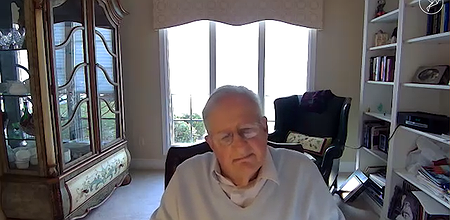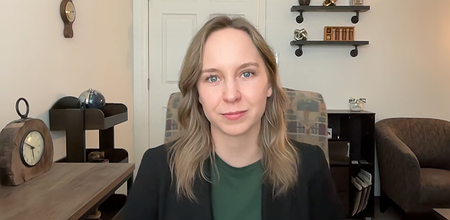- Define emotional literacy, recognize challenges in clients, and explain its development in the first six years of life
- Utilize emotional literacy and polyvagal theory as key components in trauma-informed care
- Develop therapeutic empathy to integrate across emotional literacy frameworks
- Demonstrate increased self-awareness of emotional attunement and self-reflective practice
Building Emotional Literacy in Clinical Practice
Dr. Patti Ashley, Psychologist
Master emotional literacy using polyvagal theory and attachment neuroscience for complex trauma, shame, and dysregulation in clinical practice.
Excerpt:
- 3h of continuing education
- 22 lessons that last from 5 to 15 minutes each
- 1 certificate of achievement
- 1 PowerPoint
- 1 bibliography
- 1 course evaluation
- 7-day money back guarantee
- Unlimited access
- 97% of participants who completed the satisfaction survey declare they would recommend this course to a colleague
Overview
Many clients arrive in our offices with profound disruptions in their capacity to recognize, name, and safely experience emotion—a legacy of early relational trauma, insecure attachment, or developmental adversity that shapes every aspect of the therapeutic encounter.
This training provides you with an integrated neuroscience-informed framework for cultivating emotional literacy as a cornerstone of trauma treatment. Drawing on polyvagal theory, attachment research, and developmental neurobiology, you will examine how emotional awareness develops through early co-regulatory experiences, how trauma disrupts this developmental trajectory, and how therapeutic relationships can serve as powerful agents of neuroplastic change. Dr. Patti Ashley - psychologist with over 40 years of clinical experience working with complex trauma - will guide you through the neurophysiology of shame, the autonomic foundations of emotional safety, and the clinical application of right-brain therapeutic processes that support genuine transformation.
Through this training, you will:
-
Refine your clinical assessment skills by recognizing how emotional literacy develops in early childhood, identifying the neurophysiological signatures of attachment trauma and shame, and distinguishing between autonomic states (dorsal vagal immobilization, sympathetic mobilization, and ventral vagal social engagement) that inform treatment planning.
-
Integrate polyvagal theory into your therapeutic approach using the Three Rs framework—Recognizing autonomic states, Respecting adaptive survival responses, and Regulating through co-regulation—to create holding environments where clients can safely explore emotional experience without retraumatization.
-
Implement attachment-informed interventions tailored to specific relational patterns (secure, anxious, avoidant, disorganized), utilizing strategies that range from playful engagement to environmental soothing, while addressing shame-based defenses including grandiosity, perfectionism, isolation, and people-pleasing.
-
Strengthen your therapeutic presence through right-brain empathy, mirror neuron activation, and embodied attunement that models the co-regulatory capacity many trauma survivors never experienced, supporting the development of new neural pathways through sustained relational connection.
This training will equip you with evidence-based assessment tools and intervention strategies grounded in contemporary neuroscience and attachment research. By refining your capacity to work with neuroception, facilitate ventral vagal engagement, and support clients in moving from implicit shame responses to explicit emotional awareness, you will enhance therapeutic alliance and create the relational conditions necessary for lasting change in clients presenting with complex developmental trauma, affect dysregulation, and disrupted emotional literacy.
Accreditation
Collège des médecins du Québec
For physicians who practice psychotherapy, training recognized by the Ordre des psychologues du Québec is automatically considered as activities adopted by the Collège des médecins, in accordance with Article 3 of the Regulation.
For physicians who do not practice psychotherapy, the College evaluates each recognition request based on the following criteria:
- the relevance of the activity to the practice of the profession
- the skills and experience of the trainer
- the quality of the content and its adequacy with the physician's practice
- the pedagogical framework of the activity
- the quality of the documentation provided
- compliance with the training objectives set out in the regulation
- the presence of a certificate of participation or an evaluation
About the expert

Dr. Patti Ashley, PhD, LPC is a renowned psychologist and trauma specialist with over 40 years of clinical experience treating complex trauma and narcissistic abuse. As founder of Authenticity Architects, she pioneered innovative approaches integrating neuroscience, attachment theory, and developmental psychology.
Her groundbreaking work on shame-informed therapy has transformed treatment protocols for survivors of narcissistic abuse. Dr. Ashley holds a PhD in Psychology from the Union Institute and University, with additional specialization in developmental psychology and trauma treatment.
A respected researcher and author, she wrote the influential text "Shame-Informed Therapy: Treatment Strategies to Overcome Core Shame and Reconstruct the Authentic Self" (2020). Dr. Ashley regularly conducts advanced clinical trainings internationally, helping practitioners develop expertise in trauma-informed, attachment-based approaches to healing.
Her integrative treatment model combines:
- Neurobiological trauma processing
- Attachment-based interventions
- Somatic regulation techniques
- Identity reconstruction protocols
- Shame-informed therapeutic strategies
Learning objectives
Learning material
A theoretical course illustrated with clinical examples. This course is composed of videos of 5 to 15 minutes each. The PowerPoint of the course to download.
Syllabus
- PowerPoint
- 1. Introduction
-
How Emotional Literacy Develops
- 2. What Is Emotional Literacy and Its Challenges
- 3. Attachment as the Core of Regulation
- 4. Understanding Shame
- 5. Shame, Trauma, and the Nervous System
-
Emotional Literacy in Trauma-Informed Care
- 6. Repairing the Ruptures
- 7. Creating a Holding Environment in Treatment
- 8. The ANS and Polyvagal Theory
- 9. Some Defenses Against Shame
- 10. The Four Therapeutic “R” s
- 11. Attachment Styles
- 12. Therapeutic Empathy
-
Naming & Regulating Emotions
- 13. List Of Emotions
- 14. Bridging Paradox
- 15. ABC exercise and Expressing Anger
- 16. Excavation Exercice- The Deep-SEA Dive
- 17. Connect The Dots- Rewiring the Story
- 18. Re-Storying
- 19. Activating the Right Brain Part I
- 20. Activating the Right Brain Part II
- 21. Therapist Emotional Attunement and Self-Reflection Practices
- 22. Conclusion
- Bibliography
CE Credits
Download a certificate of successful completion.
Audience
This course is intended for mental health professionals.
Your comments
"Dr Ashley is a very authentic, animated, and very organized presenter!
As well, she provides many suggestions regarding exercises, interventions etc. that support the client in improving their emotional health. Highly recommend this course!"
A psychologist (Canada)
Registration
Ask a question
Do you have a question? Then email us at contact@asadis.net
Frequently asked questions
-
Is there an evaluation at the end of the course?
To validate the achievement of the learning objectives, a final evaluation in the form of true/false questions is required. It must be completed in order to obtain the certificate of completion.
In addition, an optional self-assessment is offered at the beginning and end of the course, allowing you to measure your progress on the targeted skills.
These evaluations are not graded and are intended primarily to support your professional reflection.
-
I have a disability. Can I receive specific support?
Yes! This training is offered as a pre-recorded video format, without subtitles. If you have a disability, we can provide an adapted alternative (technical assistance for viewing or individual supervision). For any request, please contact our disability coordinator at the following address: contact@asadis.net
-
How long do I have access to the course?
After your registration, the course is accessible anytime and from anywhere with unlimited access.
-
When does the course start?
That is entirely up to you! When you buy a course, you'll receive an access link that you can activate when you want.
-
Is there a student rate?
Yes there is! To learn more, email us at contact@asadis.net.
You may also be interested in:
Legal notice
The courses offered by ASADIS are accredited by different professional organisations. In addition, ASADIS is approved by the Canadian Psychological Association to offer continuing education for psychologists. ASADIS maintains responsibility for the program.
The CPA’s approval of an individual, group, or organization as a CE Sponsor or Provider is restricted to the activities described in the approved application or annual report form. The CPA’s approval does not extend to any other CE activity the Sponsor or Provider might offer. In granting its approval, the CPA assumes no legal or financial obligations to Sponsors, Providers, or to those individuals who might participate in a Sponsor or Provider’s CE activities or programs. Further, responsibility for the content, provision, and delivery of any CE activity approved by the CPA remains that of the CE Sponsor or Provider. The CPA disclaims all legal liability associated with the content, provision, and delivery of the approved CE activity.






